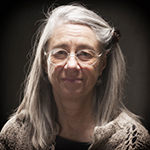
Mary Shaw
Las Vegas, N.M. –The American Society for Microbiology selected New Mexico Highlands biology professor Mary Shaw to participate in the Biology Scholars Program Assessment Residency.
The National Science Foundation helps fund the Biology Scholars Program, a national leadership initiative to improve undergraduate biology education based on evidence of student learning.
Shaw, one of only 19 biology professors in the nation selected for the assessment component of the Biology Scholars Program, participated in a five-day intensive Measuring Student Learning Institute in Washington, D.C., and is applying what she learned in the classroom.
“Over the years, I’ve become increasingly interested in the scholarship of teaching science,” said Shaw, a longtime biology faculty member and former Biology Department chair. “There’s a lot of research based on best practices for teaching STEM — science, technology, engineering and math — that improves significant learning of major concepts.
“Active learning research shows that people learn better when they are interested, engaged and involved. The goal is to cultivate deep learning, where students can apply their knowledge and think like scientists,” Shaw said.
Active learning is a methodology where professors provide students with background information and content, which the students then apply in a classroom activity to answer a scientific question or problem.
Active learning is a shift from the traditional class-long lecture format, with a number of science professors at Highlands using active learning methodology in the classroom.
The Biology Scholars Program is part of the national Vision and Change initiative aimed at changing traditional teaching methods to prepare a new generation of scientists, with a focus on active classroom learning and building undergraduate research capacity.
“You have to constantly assess if the students are learning the material to make sure they understand — and not just with exams. One method of instant assessment we’re using successfully in biology classes involves the professors presenting a short lecture, then each student uses a clicker to answer questions that feed into our receiver.
“We like this technique because it’s a form of active learning that engages students and lets us know if our lessons are effective. Then you can immediately address any problems with understanding the concepts,” Shaw said.
Highlands University is known for providing undergraduate research opportunities in the science disciplines of biology, geology, natural resource management, and chemistry.
“In biology, we’re bringing authentic, original research into the classroom and field as part of the instruction. This is another form of active learning that builds interest in the sciences and helps with retention,” Shaw said.
Shaw gave another example of an active learning technique called Think-Pair-Share. First, the instructor asks a question and the students think of the answer. Then, the student pairs up with another student to compare and discuss their answers. Finally, the students share their answers with the class.
Shaw said the ongoing assessment goes beyond student performance.
“We’re also learning to assess the biology course curriculum and course delivery in order to identify ways to enhance both for significant student learning,” Shaw said.
As part of her Biology Scholar residency, Shaw is collaborating with biology professors at Bates College in Maine and Wellesley College in Massachusetts, sharing data and assessment ideas. The facilitator for the professors is from James Madison University in Virginia.
In May, Shaw will present the results of the assessments she used in her classes and the outcomes at the 21st Annual American Society for Microbiology Conference on Undergraduate Education.
During her 20-year tenure at Highlands, Shaw has helped secure more than $1.4 million in National Science Foundation and National Institutes of Health grant funding for Highlands, with a focus on student education and research.
She earned her Ph.D. in plant pathology from the University of California — Davis and completed post-doctoral training at Oklahoma State University. At Highlands, her teaching has focused primarily on introductory science courses and labs.
